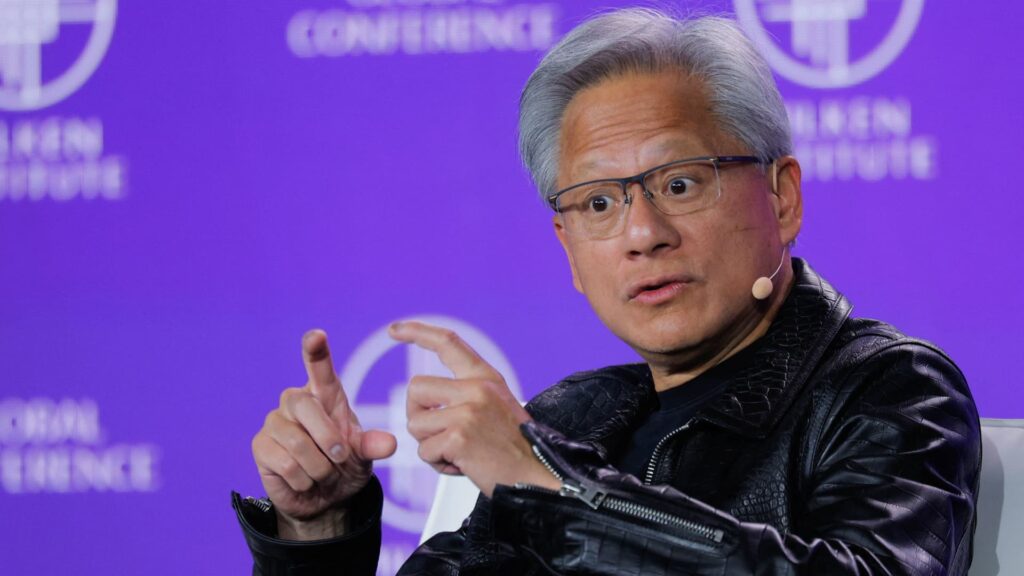You probably don’t need to worry about a robot taking your job, says Nvidia CEO and co-founder Jensen Huang.
You should, however, expect your job status to be threatened by people who understand artificial intelligence better than you do, Huang said at the Milken Institute’s Global Conference 2025 on May 6.
“Every job will be affected, and immediately. It is unquestionable,” said Huang, 62, whose $3.3 trillion company designs some of the computer chips that power popular AI tools. “You’re not going to lose your job to an AI, but you’re going to lose your job to someone who uses AI.”
There aren’t any job postings on Indeed that AI can do completely on its own, CEO Chris Hyams told CNBC Make It on March 31. But two-thirds of roles on the platform include tasks that AI can perform reasonably well, said Hyams.
Humans who can train AI systems to do so are becoming more desirable for employers, said Huang: “There are about 30 million people in the world who know how to program and use this technology to its extreme. The instrument we invented, we know how to use, but the other 7-and-a-half billion people don’t.”
DON’T MISS: How to change careers and be happier at work
Not every CEO in the AI industry fully agrees with Huang. The tech could eliminate half of all entry-level white-collar jobs within the next one-to-five years, Anthropic CEO Dario Amodei told Axios on Wednesday.
“Cancer is cured, the economy grows at 10% a year, the budget is balanced — and 20% of people don’t have jobs,” Amodei predicted, adding that he sees AI evolving from assisting many entry-level jobs to automating their responsibilities entirely.
One potential end result, he said: CEOs will simply stop listing as many new jobs for hire.
Companies like Shopify, Duolingo and Fiverr are already encouraging — or mandating — that some, or all, of their employees incorporate AI into their work. At Shopify, managers are encouraged to exhaust those tools before asking for more headcount, according to a company-wide memo from CEO Tobi Lutke.
Huang, for his part, has said that AI will lead to at least some job creation, particularly in fields like software engineering and computer programming.
“What used to be human-coded softwares running on CPUs are now machine learning generated softwares running on GPUs,” he said at The Hill and Valley Forum in April. “Every single layer of the tooling of it … is being invented right now and it creates tons of jobs at the next layer … A whole bunch of new trade jobs have to be created.”
‘Don’t be that person who ignores this technology’
Huang has frequently touted AI’s current ability to help workers do their jobs more efficiently. He personally uses chatbots like Google’s Gemini and OpenAI’s ChatGPT to write his first drafts, he said on a January 7 episode of Wharton organizational psychologist Adam Grant’s “ReThinking” podcast.
You can also use these tools for more complex projects, he noted at the conference.
“If you don’t know how to program a computer, you just tell the AI, ‘I don’t know how to program [computers]. How do I program them?’ And the AI will tell you exactly how to [do so],” he said. “You could draw a schematic and show it to it. You could draw a picture and ask it what to do.”
His recommendation: Get comfortable with AI, especially if you’re a student. Billionaire entrepreneur and investor Mark Cuban similarly advises students to learn how to use AI tools.
“When I talk to kids today and they ask me what I would do if I were 12 today, my answer is always the same, read books and learn how to use [artificial intelligence] in every way, shape and form you can,” Cuban, 66, wrote in a February 17 post on social media platform BlueSky.
Since 2019, Cuban has committed millions of dollars to hosting free AI bootcamps for high school students in low-income U.S. areas. His programs aim to help develop “under-appreciated” talent who can ultimately help boost the country’s global competitiveness, he told the Wall Street Journal in October 2020.
At the conference, Huang expressed a complementary viewpoint. “You could argue that artificial intelligence is probably our best way to increase the GDP,” he said. “Don’t be that person who ignores this technology … Take advantage of AI.”
Want to boost your confidence, income and career success? Take one (or more!) of Smarter by CNBC Make It’s expert-led online courses, which aim to teach you the critical skills you need to succeed that you didn’t learn in school. Topics include earning passive income online, mastering communication and public speaking skills, acing your job interview, and practical strategies to grow your wealth. Use coupon code MEMORIAL to purchase any course at a discount of 30% off the regular course price (plus tax). Offer valid from 12:00 am Eastern Time (“ET”) on May 19, 2025, through 11:59 pm ET on June 2, 2025. Terms and restrictions apply.
Plus, sign up for CNBC Make It’s newsletter to get tips and tricks for success at work, with money and in life, and request to join our exclusive community on LinkedIn to connect with experts and peers.


